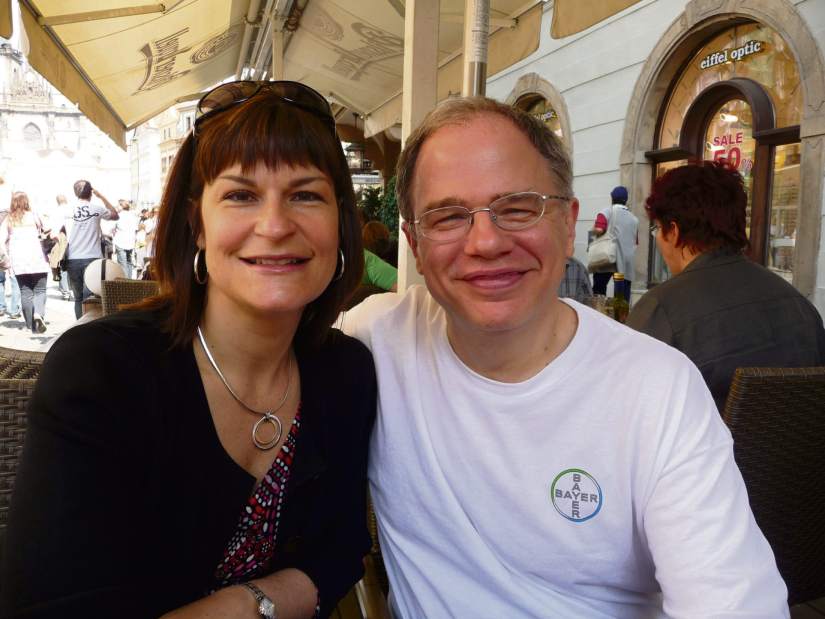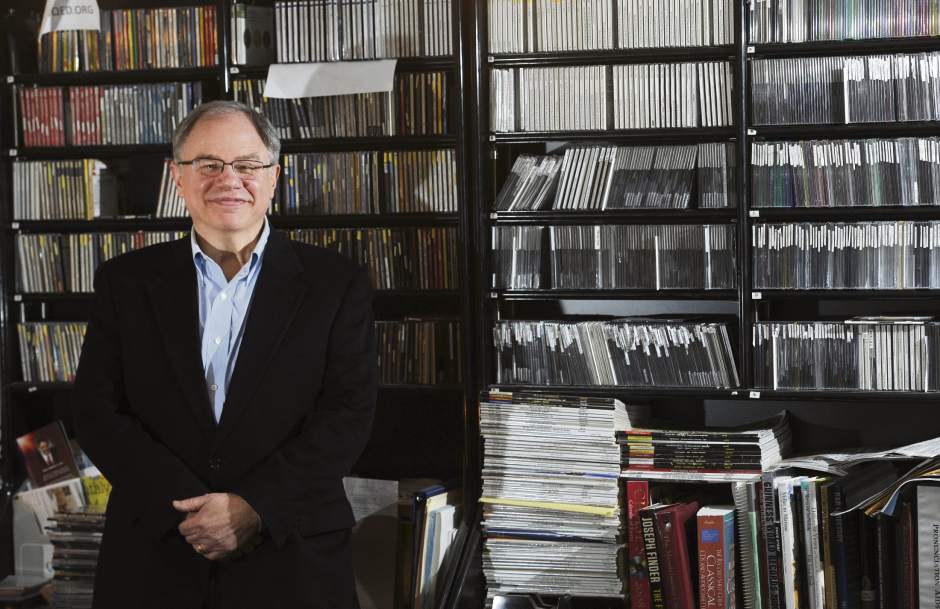WQED's Jim Cunningham: A classic voice over the years
Jim Cunningham's alarm clock has gone off at 4:45 each weekday morning for more than 35 years.
Far from complaining about it, he considers himself one of the luckiest people in the world. He's living the career he wanted since he was a teenager.
Cunningham, 60, is host of the morning show on WQED-FM (89.3) from 6 to 10 a.m., an upbeat, family-oriented program that includes general news and what's going on in the arts, as well as classical music he selects to get the day off on the right foot.
But he's also the voice of the Pittsburgh Symphony Orchestra for the station's weekly broadcast of its concerts. In addition, he interviews the conductors and guest artists for broadcasts and has gone on most of the symphony's international tours, bringing back live recordings for broadcast.
“Jim is one of the most passionate music lovers I have ever seen. He not only understands the music but loves it,” says symphony music director Manfred Honeck. “In addition, his contributions to the PSO, Pittsburgh and the world through his radio programs have been enormous. The world needs more Jim Cunninghams!”
His effectiveness as a radio personality comes from his warmth and ease at the microphone, according to Debra Acklin, chief executive officer of WQED.
“You don't get a stilted and staid performance from Jim. You never get the sense it's all about his voice and being the deejay guy,” she says. “It's much more about his love for the music and his absolutely encyclopedic knowledge about the listeners — who's calling in and what they like and don't.”
Cunningham was born in Pittsburgh in 1955, about four blocks from where he now lives in Point Breeze. His family moved to Warren five years later when his dad went to work for National Forge Company.
He grew up in a musical home in which his father loved listening to recordings and the radio and his mother played piano.
“I used to hear her playing ‘Clair de lune' and other things she liked on an upright piano in the basement,” he says. “She worked as a secretary for the First Lutheran Church and always sang in the choir. When I got into junior high, I started singing in the church choir and taking piano lesson from the church organist, Jerry Elmgren, an interesting guy who built harpsichords.”
Cunningham got turned on to radio through his mother's work as a member of Warren's Philomel Club, which promoted classical music and had a one-hour show on the local radio station.
“I think I was only 7 years old when she took me to the station because she didn't know what else to do with me,” he recalls. “She would write the scripts and put together the programs, things like Arthur Rubinstein playing Chopin. I thought the place had magic about it. At the time, United Press International had those giant teletype machines that would clatter away all the time, and you have the tapes going around, and lights blinking and turntables spinning. Even as a kid, I picked up on the spirit of the place. In a small town back then, the radio station was the center of everything, and people depended on it for school closings, the weather in a rural area. It had a little bit of everything.”
Cunningham was on the air for the first time when he was 13 at the same radio station. The show ran from 11 a.m. to noon Saturdays during an hour given to high-school kids. By 14, he was on the air regularly, filling in for other broadcasters in the summer and getting paid minimum wage.
Cunningham earned his bachelor's degree at Thiel College in Greenville, where he had a double major in English and business administration. But while he says he never thought he could make a career in radio, he got a show on the college radio station within days of arriving on campus. Two years later, he began working for Greenville's commercial radio station.
“I had constant experience of all kinds of things in a small market — livestock exhibits, election night at the courthouse, a remote unit at the Thanksgiving Day parade. And we did wild things, like playing Wagner's entire ‘Ring.' ”
While at Thiel, Cunningham became aware of WQED television and remembers seeing its broadcast of Ingmar Bergman's film “The Seventh Seal.” He approached one of his English teachers for help getting an internship at WQED, and in January 1974 began working with Fred Rogers. In his spare time, he'd hang out with Jack Somers and the radio people.
A year after he graduated from Thiel, Cunningham applied for work at WQED-FM. He started a part-time job in January 1978, and by the next year was working full time. The station was in transition after the death of Somers, who founded the station. Within a few years, Cunningham was working on Pittsburgh Symphony broadcasts.
In August 1985, Cunningham went on tour with the Pittsburgh Symphony for the first time when Lorin Maazel took it to Europe, including a memorable concert at the Salzburg Festival. He went to China with Maazel and the orchestra for concerts that included Ludwig van Beethoven's Symphony No. 9 sung in Mandarin. Traveling with the orchestra, he became better acquainted with its members.
“He's the rock of Gibraltar at WQED-FM,” says symphony principal oboist Cynthia DeAlmeida. “We wouldn't have even the WQED-FM we have today if he didn't put his whole life into it. I don't know how he covers as much ground as he does with his schedule and having a family, too. He never lets his enthusiasm down.
“We've done lots of what we call ‘Unlocking the Classics' together at which he's the emcee and I introduce what we're playing that week,” she says. “I learn new things every time about pieces I thought I knew. He's very knowledgeable about the performances of the past of the great repertoire and brings recordings and video recordings of Bernstein and Bruno Walter.”
Cunningham's work has brought him frequent contact with the orchestra's music directors Andre Previn, Maazel, Mariss Jansons and now Honeck.
“We have never had as much involvement as we do with Manfred,” Cunningham says. “He comes out every Wednesday morning before every concert from 8:15 to 9 a.m. before he goes off to rehearsal. We had lots of luck with the others, but Manfred has done more than anyone else. It's all part of his community involvement.”
Cunningham copes with his often long days by going home for a nap before evening work begins, such as the live broadcast of the Pittsburgh Symphony concert on Dec. 4.
“He's always had a very busy schedule, but he's also a family man and has been very active in our lives,” says his son, Jim Cunningham IV. “He's always supported me in all of my musical endeavors.”
His son began violin at age 4 and is now concertmaster of the Pittsburgh Creative and Performing Arts School orchestra and principal viola of Pittsburgh Youth Symphony.
Dozens of people worked at WQED-FM during its heyday under Ceci Somers in the 1980s and '90s, but after the latest reductions in staff at the end of September, Cunningham and program manager and production director Bryan Sejvar are the only full-time radio employees. All of the station's programming not produced by Cunningham is provided by Minnesota Public Radio in St. Paul.
He says the station hopes to build back up, but even now remains committed to community service.
“The No. 1 appeal of this job is helping others, the listeners and musicians of our area,” he says. “I can tell from speaking with callers that some of our listeners are having hard times and really need the station to hold onto. And many of the smaller arts groups can't afford advertising, so we help get the word out.”
Robert Page, music director emeritus of the Mendelssohn Choir puts it simply: “We love him. We respect him. We love what he has done for the arts in our city.”
Mark Kanny is classical music critic for Trib Total Media. He can be reached at 412-320-7877 or mkanny@tribweb.com.




